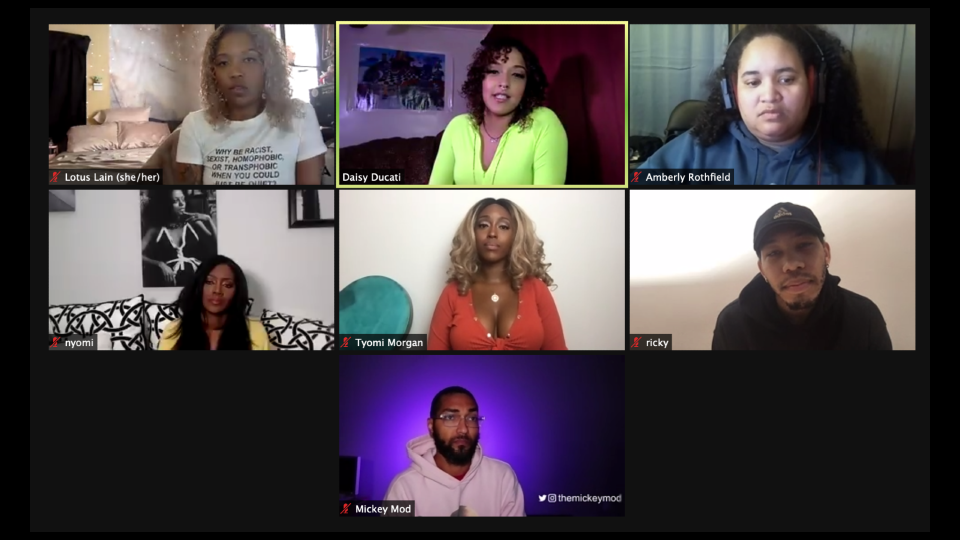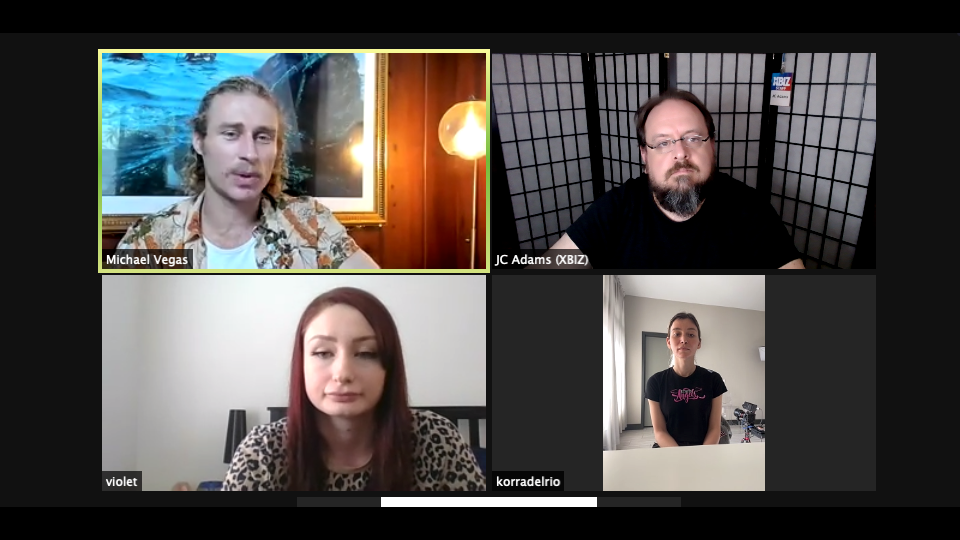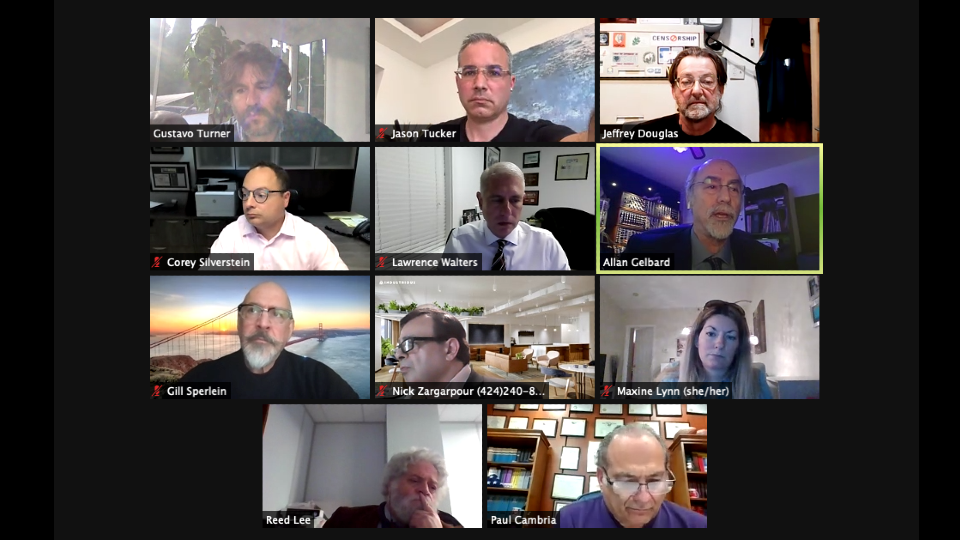LOS ANGELES — Day Three of XBIZ 2021, presented by Chaturbate, provided a welcome opportunity for industry stakeholders — particularly talent — to sound off on a variety of pressing topics, from consent and sexual fluidity, to testing for COVID and the New War on Porn. An emotional symposium on race in adult turned a spotlight on a common theme that echoed throughout the day's schedule of panels: the need to really listen with a fully open mind to what performers are saying.
Closing out a full day of networking and frank discussion on Wednesday was the live broadcast of the 2021 XBIZ Honors exclusively on XBIZ.net with the dynamic duo of Charlotte Stokely and XBIZ Managing Editor of Digital Media Alejandro Freixes hosting the online industry edition, presented by Chaturbate, and pleasure products industry vet and clinical sexologist Dr. Sunny Rodgers hosting the retail edition, presented by Satisfyer.

“Race in Adult: 2021 Edition”
The “Race in Adult: 2021 Edition” symposium was conceived as an update on the well-received pair of virtual town halls on the subject — from both the talent and retail points of view — that XBIZ organized in the summer addressing the impact of the #BlackLivesMatter movement in the adult industry.
Moderated by performer and Free Speech Coalition (FSC) Industry Relations Advocate Lotus Lain, the Adult Time-sponsored panel included BIPOC performers, producers and community figures Daisy Ducati, Nyomi Banxx, Tyomi, Mickey Mod, Ricky Johnson and Amberly Rothfield.
Kink.com was praised by Ducati and others for being a pioneer in giving BIPOC performers “a platform to speak for ourselves and discuss our own grievances and what we want to do and the changes that we want to make.”
“It’s really important that the industry actually listens to us instead of trying to decide what to do for us,” Ducati added.
While Johnson explained that MindGeek and Brazzers, the companies he works for, have been doing “a good job even before #BlackLives Matter,” Mod provided a nuanced analysis of studio gestures. The performer and Kink.com Creative Director emphasized that sometimes gestures that may seem positive, like studios donating money to national organizations for social justice, could be better channeled by investing in organizations like the BIPOC Collective or others, which have a more direct impact on the adult community.
There was also time for conversation about the different racialized terms that industry has been using for marketing content, with some performers objecting to words like “ebony,” while others were willing to embrace the term and re-signify it, in the same way that the LGBTQ+ community took back “queer.”
Tyomi made the point that language often exists “in a gray area” and that words that might be considered derogatory can revert to being acceptable. The panelists agreed that SEO should be considered when discussing controversial words used in marketing.
Lain commended the panelists for “keeping it real” and giving their unfiltered, candid impressions of the shifting situation of BIPOC performers in the industry.

"Sexually Fluid: Meeting Consumer Demand for Genre-Defying Content"
The Content Track continued on Day Three with "Sexually Fluid: Meeting Consumer Demand for Genre-Defying Content," moderated by XBIZ News Desk Manager JC Adams, who engaged with performers Korra Del Rio, Violet Monroe and Michael Vegas about what the term "sexually fluid content" actually means — with Vegas, notably, making the elegant point that it's the performers who may be sexually fluid, not the content itself.
All three performers spoke eloquently about using their work in adult to explore their sexuality; Del Rio, particularly, described finding a safe, welcoming space in adult after experiencing body dysmorphia. The discussion "sparked all kinds of ideas," she said, about how to elevate sexual exploration and fluidity for both the performers and the audience alike.
Monroe spoke frankly about navigating her way through studio shoots that occasionally require her to film content that "doesn't necessarily align" with her personal preferences. All three — Del Rio, Monroe and Vegas — noted greater freedom and agency in recent years, notably during the ongoing pandemic lockdowns as performers pivoted swiftly to producing and filming their own content in greater numbers.
Adams and the panelists acknowledged the challenge inherent in trying to define something that, by its nature, defies categorization. However, the entire panel — and an active chatroom — emphasized that sexually fluid content clearly sells; over the past year, in particular, fans enjoyed far greater access to quality content self-produced by performers who have been free to explore their own interests rather than confirm to an algorithm.
Credit was given to such pioneers as Lance Hart and Wolf Hudson, whose bisexual content helped spark a wave of interest in the genre, as well as studios and directors who choose to cast performers across genres.
The challenge of meeting consumer demand for sexually fluid content is actually quite simple, noted Monroe: talk to your models, a sentiment echoed by Del Rio and Vegas. Ask them about their personal preferences and have an open-minded discussion about boundaries. The result will be content — even if it defies what "straight," "trans," "bi" or "gay" content is supposed to be — that is personally fulfulling for the talent and will more fully engage your customers.
"FSC Presents: On-set Consent – A Directors’ Perspective"
When it comes to adult performer consent, the directors — incliduding Jessica Drake, Ricky Greenwood and John Paul the Pope — who took part in this Content Track session 'walked the talk.' Each of them was extremely serious about respecting a performer’s right to consent to whatever was being filmed that day on set, to selectively refuse consent to specific acts based on their personal comfort levels and to revoke consent at any time during production.
“There are three pillars of consent,” explained Wicked Pictures contract star Jessica Drake. “The first pillar is understanding what things are involved, what scenarios/sex acts might be involved and what people might be involved. The second pillar of consent is making a personally informed decision as to where you, as a human being, stand on any one of those given things. And the third pillar of consent is conveying that to the people that you're having a scene with.”
For consent to be truly informed, the adult performer must be properly briefed about the day’s proposed shooting schedule, said Mile High Media’s Ricky Greenwood. This is why he sends performers emails before the shoot to outline what specifically has been planned. “Everything is written down,” Greenwood said. “It's very important that everybody understands what's happening and what will happen during the scene ... (to) make sure that everyone is comfortable with it.”
The panelists agreed that consent can be withdrawn by performers at any time during the shoot, should they feel uncomfortable with where the shoot is going, or just emotionally unprepared to deal with certain sex acts at the time. “Just because a model shows up and they're a massive anal queen doesn't mean they're going to show up and be anal that day,” said Kink.com’s John Paul the Pope. And when they don’t, their lack of consent has to be respected.
Unfortunately, some adult performers don’t feel comfortable voicing their concerns on set. This is why their directors need to pay attention at all times. “Stop looking at Twitter,” said Greenwood. “Listen to what's happening on your set!”

"Consent and Acceptance: A Performers’ Perspective"
The topic of adult performer consent carried over from a panel focused on directors to a frank and sobering discussion among talent. There was a general agreement that much-needed industry discussions on consent have improved in recent years, but the emotional scarring caused by years of directorial abuse was clearly on the panelists’ minds.
“Accountability is a thing for me ... that I was not given one single time as talent,” said performer-turned-director Aiden Starr. She said the same was true for fellow performers/panellists Dana DeArmond and Natassia Dreams "because we've had these conversations, like, about details of how we said, ‘Hey, I know you didn't realize you were doing this to me, but you did it.' And instead of being offered an apology or listened-to, we were penalized and were not hired again.”
“I've had directors say, ‘Oh, you can hit her. She used to work at Kink,’” said DeArmond. “Shit like that is inhumane ... I've been penetrated in ways that were not planned for ... people [didn't] ask. And that's the point of consent, is asking.”
Now that they have moved into directing, Starr and DeArmond are providing the respect for consent that they were denied in the early 2000s. In this way, both former performers echoed the positive sentiments expressed during the Directors’ consent sessions before them. But Starr and DeArmond’s stark testimonies, and the stories told by fellow panelist/performer Natassia Dreams, made clear that the adult production industry has a lot to answer for.
Notable industry figures like Starr and DeArmond are actively promoting consent in the adult production industry today, and their work is inspiring younger performer/producers like panelist Lance Hart to do likewise.
“Aiden was actually a really good example for, like, how to run a set for me,” said Hart. This includes altering the day’s shoot when a performer no longer consents to whatever was previously agreed upon. “If we're supposed to shoot anal that day, and for some reason it ain’t happening... we can shift gears and we can shoot another thing,” he said.

"Legal Outlook: Beyond the Election"
This year’s legal panel — sponsored by YourPaysitePartner and moderated by XBIZ News Editor Gustavo Turner — featured a veritable dream team of top legal minds who counsel the adult industry. The roster included industry attorneys Paul Cambria, Jeffrey Douglas, Corey Silverstein, Larry Walters, Maxine Lynn, Allan Gelbard, Reed Lee, Gill Sperlein and Nick Zargarpour, as well as copyright consultant Jason Tucker (Battleship Stance).
The panelists discussed the legal landscape for website operators, adult producers and performers through 2020 developments and looking forward to 2021. Larry Walters kicked off the proceedings with a summary of challenges to free speech and sexual expression, particularly the very high-profile movement to repeal or reform Section 230, the so-called “First Amendment of the internet.”
Walters also highlighted the CASE Act that was passed as part of the spending bill and some copyright changes that might affect IP holders in the industry and even “change the legal landscape” for infringement cases. European issues surrounding Brexit and the GDPR were also mentioned in his presentation.
Agreeing with Walters, Jeffrey Douglas — Free Speech Coalition Board Chair — also warned against the increasing normalization of the notion that “commercial consensual sexual activity is equivalent to sex slavery.” Reed Lee, drawing on a career-long commitment to free sexual expression issues, noted that “the background scene is changing with respect to efforts [regarding 2257 compliance] in important ways that we oughta be sorting through."
Paul Cambria, who represents one of the defendants on the Backpage.com case (being used by War on Porn activists as a blueprint for their attacks on Pornhub and other companies), emphasized that “the case hasn’t been tried yet” and agreed that the biggest overall challenge is people in power “trying to get rid of Section 230 completely.”
In terms of IP law, Maxine Lynn mentioned that “there’s a lot up in the air right now, in adult and in the world, but companies should remember to keep to the basics: keep protecting your patents and keep protecting your trademarks."
After Zargarpour emphasized the need for legal advice concerning contracts, Silverstein stressed the importance of doing at the very least minimal due diligence for performers that might find themselves self-producing content for premium sites and other streams.
“Since COVID started, conventional adult content creation basically stopped and you had thousands of models all over the world who basically said, ‘I need to pay my bills,'" Silverstein explained. “They went into business for themselves.”
“I’ve been telling people, ‘There’s responsibilities that come with that,’” he added, pointing out that the time for indie performers to get in touch with a lawyer to straighten out their paperwork is “immediately.”
Before the legal panel adjourned, Walters offered a moving remembrance of his mentor John H. Weston, an adult industry attorney and First Amendment champion who passed away last year.
"Performer Testing: Looking Beyond COVID"
The “Performer Testing” panel — where stakeholders provide an update on the adult industry’s groundbreaking standardized testing protocols — gained unique relevance this year due to a pair of related developments.
The Talent Track seminar, sponsored by Stripchat, was moderated by XBIZ News Editor Gustavo Turner.
First, the unresolved COVID-19 pandemic that continues plaguing the world and every walk of life, necessitated the introduction of new industry protocols to test performers — and crew — for a non-STI illness. The debate about how or whether to incorporate COVID testing into the PASS system regulated by Free Speech Coalition (FSC) resulted in the second development in 2020: the decision by the largest testing provider, Talent Testing Services (TTS), to withdraw from PASS.
The panelists gave snapshots of the current situation, provide some lessons learned from last year’s largely successful handling of this difficult situation (which allowed for some shooting to begin after an initial shutdown), and also give their educated guesses for what’s coming in 2021.
After the FSC’s Ian O’Brien, who has been monitoring the situation closely since the beginning of the pandemic, gave a general overview of the current recommendations, agent Marc Schecter, owner of ATMLA and also a member of the FSC’s COVID task force, explained what the situation was for talent coming on set.
“The FSC guidelines are working,” Schechter explained. “They’re meant to provide boundaries that the talent and studios can work within. And then within those guidelines, each studio has developed their own set of standards that fit their criteria.”
Public health expert and adult performer Valerie Webber remarked on “how quickly people have been able to get on board with the COVID addendum to the existing testing structure.”
“There’s even been a number of mainstream publications — like the New York Times — that said, 'We need to be looking at the porn industry, we can learn from the history, we can learn from them, they’ve been doing this for a long time. Why aren’t we paying attention to that?’” she added.
Sixto Pacheco of TTS ended the presentation on an optimistic note.
“We try to protect everybody as best as we can,” Pacheco said. “But there is a light at the end of the tunnel. You have a vaccine that’s coming into play. It’s signs of hope. There has to be a way. We will get over this. We are getting over this.”

"State of the Industry"
If it happened to Pornhub, it can happen to you. That was the clear message delivered during the annual XBIZ "State of the Industry" session, in reference to MasterCard, Visa and Discover cutting off payments to the tube site in December 2020.
"For those people that are out there celebrating (Pornhub’s fate), I really don't think they see, from a big picture, how bad this really is for the industry as a whole,” said Corey Silverstein of Silverstein Legal. “MasterCard and Visa reacted because they were associated with a porn company on the front page of the New York Times ... Once again, the very thought of a mainstream company being in the same paragraph as a porn company made them act because of the public outcry.”
Given this fact, every single adult enterprise that relies on credit card payments is just as vulnerable to being cut off as Pornhub, Silverstein said.
“I keep hearing people say that, ‘There's going to be, like, these discussions with MasterCard and Visa.' There's no discussions. It is a dictatorship," he stated. "They are going to state what their processing rules are. And we're either going to live by it and abide by it, or they're not going to do business with us."
To make matters worse, “the adult entertainment industry is still a target,” Silverstein warned. At a time when lapsed federal legislative proposals hostile to the industry could be revived once the Biden administration takes office, he said, "we are a giant target for the government. We are a giant target for various different groups all across the world.”
On the plus side, “We have a window ... to do some house cleaning,” he noted. “Now's the time to be sitting down and not just waiting for new rules and new regulations to come out. We need to be acting right now. Everyone should be looking at how they're operating and saying, 'Okay, we're doing A-B-C-D- and E wrong.' We need to fix it."
Silverstein’s warning comes at a time when the adult industry “has never been so mainstream” due to COVID-19 lockdowns keeping people at home, reflected moderator and Falcon/NakedSword President Tim Valenti. “More people talked about, bought and made adult content than ever before," he said.
"Early on in the pandemic, many of us speculated that this would be the year that removed the stigma from sex,” he added. “But in the last few weeks of the year, we saw a renewed assault on adult ... 2020 was a hugely profitable year for many, but (it could be) followed by potential [trouble]."
Among the additional industry notables contributing their expertise to the bracing discussion were Cathy Beardsley of Segpay; Lance Hart of PervOut; Tim Henning of ASACP; Shirley Lara of Chaturbate; Michelle LeBlanc of Free Speech Coalition; Brad Mitchell of MojoHost; Liz Rekevics of Streamate; Megan Stokes of NMG; and Leya Tanit of Pineapple Support.
Click here for XBIZ's coverage of the week's events.
Reporting by JC Adams, Peter Berton, Nicholas Gottlieb and Gustavo Turner.








